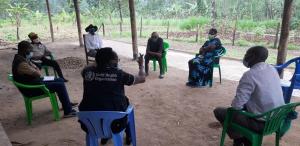WHO Guides the Bagisu Community on Carrying out a Cultural Norm while observing COVID-19 Guidelines
The period between August to December of every two years is cherished among the Bagisu, a tribe in the Mbale sub-region, eastern Uganda. This is the time when the highly revered traditional circumcision ceremony of boys known as “Imbalu” is held.
To the Bagisu, “Imbalu” marks the initiation of boys into manhood. Every year, hundreds of boys aged 16 and above qualify for the “Imbalu”. The ceremony is eagerly anticipated by all people in the sub-region and parents with candidates often talk and walk with exuberant pride in the villages promising whoever cares to listen, a show of bravely from their sons.
On the day of the “Imbalu”, activities are carried out in the village town square and superintended over by the Bamasaba Cultural Institution. The young boys, smeared head to toe with local herbs and other mixtures, are brought in front of a jubilating crowd to “face the knife” under everybody’s careful gaze. An experienced traditional circumciser does the job without anaesthesia on each unflinching boy.
Thereafter, the jubilations kick into a frenzy with crowds ululating and dancing to pulsating traditional music. Usually, crowds turn into a mammoth as people trek with the circumcised boys around the villages until they reach all the circumcision sites. It is a time to make merry!
Unfortunately, this year, if the “Imbalu” ceremony was to be carried out as tradition demands, it would have been fertile ground for the spread of COVID-19. This was the fact and reality the traditional leaders and the public had to understand and appreciate.
Prior to August 2020, the World Health Organization (WHO) field team, the Ministry of Health and the Mbale district health authorities had anticipated this and made appropriate preparation.
With funding from the Irish Government, this team implemented a COVID-19 Risk Communication and Community Engagement Response plan for the Mbale sub-region involving all stakeholders leading to understanding the challenges and threats posed by the COVID-19 outbreak to the “Imbalu” ceremony.
Under the leadership of Dr Dominic Waburoko, a retired Senior Medical officer who is now Minister of Health of the Bamasaba Cultural Institution and with guidance from WHO, the traditional leaders formed a COVID-19 task force. The task force members identified key community influencers and community entry point persons and worked with them to traverse villages raising awareness on COVID-19 and explaining to the people why the “Imbalu” ceremony cannot be held as before.
Several leaders and homogeneous groups such as lower-level representatives of the Bamasaba Cultural institution, traditional circumcisers, peer educators, teachers, school children, market people and worshipers who usually constitute the dancing troupes during “Imbalu” were engaged and many understood the message.
In all the engagements, the point of agreement was: “Imbalu" had to be held this year but the gatherings, processions and dancing had to be suspended. Representatives of the Bamasaba Cultural Institution and opinion leaders from many villages with a vast knowledge of the culture concurred that there would be no contravention of cultural norms and culture if the pomp and ceremony after “Imbalu” were suspended till further notice.
James Kuloba Massa, one of the prominent elders in the sub-region testified that: “five of my six sons were circumcised from the hospital, without processions and nothing has ever happened to them. They are very successful,” he said.
Sixteen-year-old Julius Wetaka one of the circumcision candidates was at first disappointed at the resolution of banning processions but after explanations from the field team, he declared that “I have no choice but to abide by the Ministry of Health guidelines, lest all my people die from COVID-19. I will not go to the processions; they will circumcise me from my father’s home."
The risk communication activities were extended to all districts in the Mbale sub-region and by the time of the “imbalu” there was almost total consensus that processions following the ceremony should not be held as they would be serious drivers of the pandemic.
The Resident District Commissioners, the chairpersons of the COVID-19 District Task Forces reinforced this resolution on all local FM radio stations thereby sending it even to the hard-to-reach areas.
The 2020 “Imbalu” season ended and many young boys were circumcised either at home, in hospitals or in other designated safe places. For the first time in decades or even centuries, there was no ululating, dancing, and trekking of villages showing off brave young men. The Basigu will never forget that year!
Health Promotion Advisor
Tel. : +256 414 335505
Cell: +256 772 507906
Email: sensasib [at] who.int (sensasib[at]who[dot]int)
Public Information Officer
Tel. : +256 313 335569
Cell: +256 786 497073
Email: mwebembezie [at] who.int (mwebembezie[at]who[dot]int)



